Medical expert of the article
New publications
Treatment of menopause in women with medicinal herbs with estrogen
Last reviewed: 06.07.2025

All iLive content is medically reviewed or fact checked to ensure as much factual accuracy as possible.
We have strict sourcing guidelines and only link to reputable media sites, academic research institutions and, whenever possible, medically peer reviewed studies. Note that the numbers in parentheses ([1], [2], etc.) are clickable links to these studies.
If you feel that any of our content is inaccurate, out-of-date, or otherwise questionable, please select it and press Ctrl + Enter.
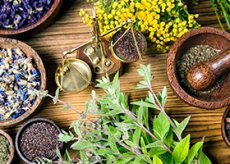
Every woman experiences age-related changes during a period of her life, when the body's production of sex hormones noticeably decreases. In medicine, such a restructuring of the body is called menopause, during which disorders associated with the cardiovascular and endocrine systems, as well as problems with metabolism and other malfunctions in the body can be observed.
Headache, hot flashes, increased sweating, dizziness, sudden mood swings accompany a woman during this period, and the desire to relieve these symptoms becomes natural. Currently, the arsenal of pharmacy chains has many different drugs that can reduce or eliminate most of the unfavorable symptoms.
What herbs should you drink during menopause?
There are also many medicinal herbs in nature that are rich in useful minerals and microelements that can protect the female body during the difficult period of menopause. Herbs are suitable for all women, they are absolutely safe for health and rarely cause side effects.
To reduce the intensity, frequency of hot flashes, general weakness and other unfavorable symptoms of menopause, many traditional healers recommend taking orthilia secunda, sage, red brush, oregano, which will significantly alleviate the condition of women, as they contain substances with powerful estrogenic properties.
During menopause, increased nervous excitability is often observed, which can be eliminated with valerian root, motherwort, chamomile and hop cones. Beetroot juice has an effective effect, it cleanses the liver, gall bladder and kidneys, increases the level of hemoglobin, has a good effect on the functioning of the lymphatic system of the body and has a beneficial effect on the composition of the blood.
Women give good reviews to raspberries, strawberries, lingonberries, licorice and peony roots, angelica, birch leaves, calendula, St. John's wort, hop cones and other medicinal herbs. Let's consider the most popular of them.
- Sage. To normalize the condition of the female body, reduce hot flashes, sharp redness of the face and hands, and also to increase the secretion of the sex glands, sage is simply irreplaceable. Decoctions, tinctures, leaf oil are used, and to achieve greater results, it is added to salads, soups, main courses and tea.
- Hawthorn. Hawthorn fruits, flowers and tinctures are widely used in folk medicine. This popular plant will help relieve hot flashes, suffocation and dizziness caused by heart failure. It also regulates blood pressure, which is of great importance for the body during menopause.
- Oregano. It is popularly called motherwort. The herb regulates the menstrual cycle and can cause menstruation at the early stages of menopause. When taken regularly, oregano can prevent hot flashes in advance and alleviate them in the future. It has a beneficial effect on the nervous system and regulates hormonal levels.
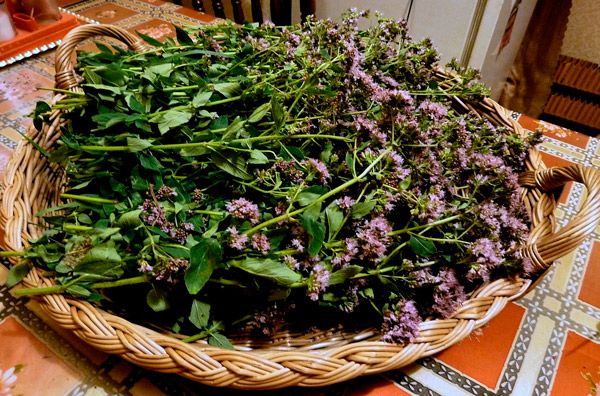
- Nettle. The herb contains minerals, microelements, vitamin D, which is the basis for the body's skeletal system, promotes the absorption of calcium salts, and ensures bone flexibility. Nettle has a positive effect on the heart muscle and significantly alleviates the general condition, and a decoction of nettle and shepherd's purse will stop bleeding, which often occurs during menopause.
- Red clover. A well-known meadow plant, which became famous due to its high content of phytoestrogens, which women especially need during menopause. In addition to useful minerals, it contains a large amount of vitamins A and C, which helps strengthen the lungs and heart. Clover is especially effective for mastopathy of the mammary glands.
- Oats. It is rich in calcium, magnesium, chromium and other minerals that strengthen bones, heart muscle, and have a beneficial effect on the nervous system. It is often called "herbal Viagra" because it can increase sexual activity, which can decrease sharply during menopause.
To delay and alleviate the symptoms of menopause, folk medicine has many herbs and recipes, the use of which will help it pass without complications in a short time.
Herbs for menopause and hot flashes
During menopause, women experience unpleasant physiological disturbances in the form of hot flashes, increased sweating and chills, which in medical terminology is called climacteric syndrome.
Unfortunately, at present, doctors have not yet determined the main cause of hot flashes, so in order to alleviate the condition, doctors select effective methods of eliminating the symptom individually for each woman. Many doctors recommend their patients to use medicinal herbs, since some of their types and collections contain the necessary substances that have a powerful effect, which can significantly affect the improvement of the condition during the period of climacteric syndrome.
The most popular herbs that are popular with doctors and patients to relieve hot flashes are mint, sage, lemon balm, red brush, calendula, motherwort, linden, oregano, hop cones. Nasturtium, hop cones, hyssop, burdock, yarrow, clover, orthilia secunda and other herbs are very helpful.
Tinctures of valerian and motherwort have a good effect on hot flashes; they not only eliminate symptoms, but also have a calming effect, relieve anxiety, headaches and dizziness. Moreover, with frequent attacks of hot flashes in women, the load on the heart increases, so it is advisable to combine the intake of these tinctures with herbal decoctions.
In addition to herbs, herbal infusions are widely used, in which the healing properties of herbs complement each other. For example, hawthorn flowers, blackberry leaves, woodruff, marsh cudweed and motherwort taken in equal parts will relieve hot flashes and also help to return to a normal state, a cheerful mood during a severe course of menopause.
You can make a healing tea that includes chamomile flowers, sage, lemon balm and savory. This aromatic mixture will eliminate hot flashes, calm the nervous system and normalize sleep.
Folk remedies for hot flashes are very popular, and their effectiveness has been tested for years. All herbs have reasonable prices, they can be bought at a pharmacy at any time or prepared independently. Each woman can choose the composition of herbs for herself, but before taking it is better to consult with your doctor.
Herbal collections for menopause
Traditional medicine knows many recipes that have an effective effect on a woman's condition during menopause. To improve the general condition and relieve adverse symptoms, it is recommended to take herbal infusions that have a good effect on the body. Herbal infusions are widely used:
- peppermint, lemon balm, linden, thyme, motherwort, rose hips;
- wormwood, fennel, valerian, mint, lemon balm, raspberry, blackberry leaves, strawberries;
- fruits of red rowan, hawthorn, rose hips, raisins and dried apricots;
- hop cones, lemon balm, alchemilla, nettle, rose hips and hawthorn berries;
- calendula flowers, common violet, licorice herb, sage and valerian root.
A collection of herbs that are good for menopause:
- Herbal collection, the main component of which is sage. To prepare it, take 2 parts of sage leaves and 1 part of lemon balm, marsh cudweed, blue polemonium and blackberry leaves. Pour one tablespoon of the resulting mixture with boiling water. You can drink tea 3-4 times a day.
- Dry blackberry leaves - 3 parts, motherwort herb - 2 parts, hawthorn berries, immortelle herb, lemon balm - 1 part each. Pour boiling water over the herbal mixture and leave for about an hour. Take 1/3 cup before meals. With regular use, in two weeks your sleep will improve, hot flashes and headaches will decrease, and you will feel more energetic and in a better mood.
- Take herbs in the following proportions: rose hips, hop cones, lemon balm herb - one part each, lady's mantle herb - three parts. Grind everything well and mix, then pour one tablespoon of the mixture with boiling water (0.5 l), put it in a water bath, and hold for 15 minutes. Let the mixture brew for another 1 hour, then take one tablespoon 4 times a day before meals.
Tea helps well during menopause. We offer several popular recipes:
- A healing tea that improves your general condition. To make it, take 2 parts of crushed white willow bark and 1 part of linden blossom. Pour boiling water over the mixture and continue to boil for about 10 minutes. Then strain the decoction, cool it a little and drink it warm. You can drink up to 5 cups of tea a day, and to make it tastier and healthier, you can add a teaspoon of honey or a slice of lemon.
- Tea made from blackberry leaves, thyme, lemon balm and linden in equal proportions will relieve hot flashes, improve sleep and calm the nervous system.
Non-hormonal herbs for menopause
Herbs and herbal infusions can not only ease a woman's condition during menopause, but also make her more attractive, so many women prefer to take herbal decoctions, herbal teas, infusions, and use herbs in cooking fresh. Herbs have a mild sedative effect, a beneficial effect on the nervous system and on the functioning of internal organs.
Non-hormonal herbs include: burdock, linden flowers, chamomile, lemon balm, peppermint, stinging nettle and other herbs. If during menopause a woman's condition is accompanied by nervous system failures or vegetative reactions in the form of hot flashes, infusions of lemon balm, valerian, oregano and chamomile help well in such cases.
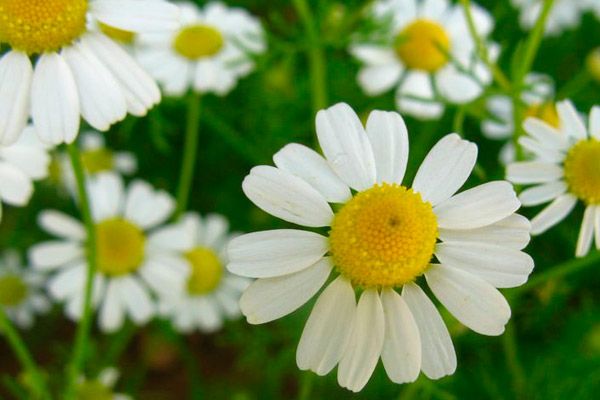
To relieve mental stress and depression, St. John's wort is used, but one should not forget that this herb does not mix well with antidepressants and heart medications.
During menopause, there are disturbances in the functioning of the heart and blood vessels. To improve the condition, traditional healers recommend taking an infusion or decoction of hawthorn. It can be drunk instead of tea, after which the normalization of the heart rate and blood pressure is immediately observed, and the metabolism improves.
Taking into account the individual characteristics of the body, doctors do not recommend choosing herbal treatment on your own, since in some cases such therapy can be harmful to health.
Hormonal herbs for menopause
Many women have experienced problems of hormonal imbalance during menopause, as the lack of hormones affects the body with negative manifestations in the form of hot flashes, nervous breakdowns, severe headaches and other symptoms. To eliminate this problem, there is a special drug therapy in medicine, but in nature there are also a large number of hormonal herbs that help to cope with this problem.
Herbs and herbal infusions that help restore hormones are unique in that they do not add the amount of missing hormones, but normalize their natural production. Hormonal herbs have a positive effect not only on female genitals, but also on other processes occurring in the body. For example, they improve metabolism, stimulate the endocrine system of the body, and improve the psychological state.
Let's take a brief look at herbs that restore estrogen, progesterone, and testosterone levels in a woman's body during menopause.
Angelica root (angelica, wolf's pipe, spindle, ladybird). It is widely used to treat almost all female diseases caused by hormonal changes, as it normalizes estrogen activity, and its individual components stimulate the nervous system, eliminate weakness and headaches associated with climacteric syndrome. Angelica root relieves symptoms characteristic of menopause, such as hot flashes and vaginal dryness. Tibetan medicine considers it indispensable for women during menopause, as it copes well with the regulation of female sex hormones. It has a reputation as the best plant for women during menopause, it is mainly used to restore estrogen balance and normalize the menstrual cycle.
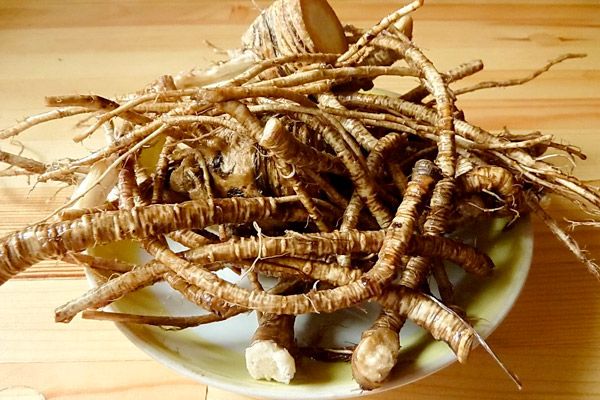
Horny Goat Weed (elf flower, epimedium). This unique plant is rightfully considered an effective plant hormone that restores and enhances the body's sexual functions. Scientific studies have proven that the plant increases testosterone production, restores sexual desire and stimulates the body's nervous system. Moreover, it has a positive effect on increasing the number of sperm, their mobility and sperm density. Horny Goat Weed has a beneficial effect on large blood vessels, it dilates capillaries, thins the blood and normalizes blood pressure, and also improves the circulation of the pelvic bloodstream, which has a positive effect on sexual function.
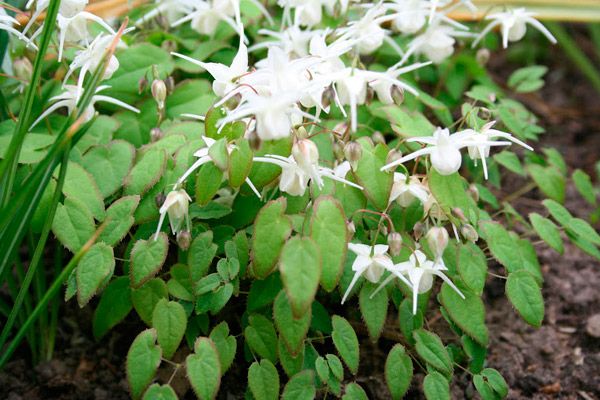
Vitex sacred (monk pepper, chaste tree, chaste tree). Contains progesterone and flavonoids, which has a positive effect on the female reproductive system. It helps to normalize female sex hormones, reduces pathological symptoms during menopause, such as tension, anxiety, sudden mood swings, insomnia. The result of the treatment is not immediately noticeable, approximately 4-6 weeks after the start of treatment.
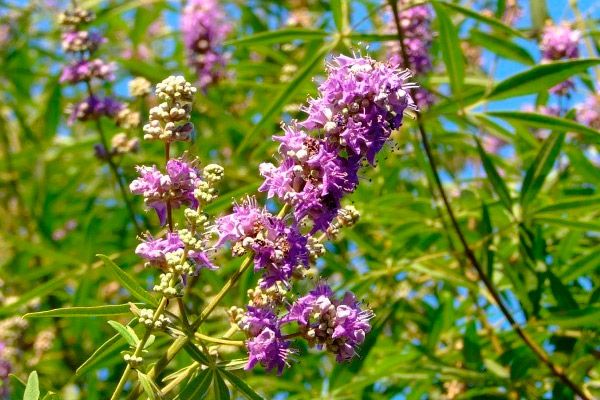
Sophora lutea, black cohosh root, peony, oregano, soy, flax seeds and other herbs have good reviews among women. Hormonal herbs cannot completely replace natural hormones, but they will help to cope with many women's problems.
Herbs for menopause with estrogens
During menopause, women experience hormonal surges, which lead to an imbalance of estrogens. In this case, doctors prescribe synthetic hormones, which in many cases are contraindicated for many chronic diseases. Moreover, numerous scientific studies have proven that synthetic estrogens increase the risk of breast tumors that develop during menopause, so it is very important to pay attention to herbs with estrogens during this period of time.
Estrogens are the female sex hormones responsible for the functioning of the body's reproductive system and regulating the correct menstrual cycle.
Plant estrogens (phytoestrogens) are found in nature, they produce an effect similar to the effect of natural estrogens produced by the ovaries, only somewhat weaker. They are successfully used in modern medicine for various hormonal disorders, in particular during menopause.
The most phytoestrogenic activity is possessed by red clover, orthilia secunda, shepherd's purse, red brush, alfalfa. Recent studies have discovered a unique component in red clover that actively counteracts the development of cancer cells. Plant estrogens are contained in parsley, sage, chamomile flowers, sweet clover, licorice root and hops, only in smaller quantities.
A large amount of phytoestrogens is contained in oat, barley, wheat and rice cereals, in flax and sunflower seeds. Phytoestrogens are also found in peas, beans, lentils and soybeans, cabbage, carrots and apples, so during menopause it is advisable to include products from this list in the diet.
Of course, it is impossible to completely replace natural estrogen in a woman’s body, but when menopause occurs, these plants will help to smooth out the negative symptoms of climacteric syndrome.
Sage during menopause
The most effective remedy for menopause is sage, which can significantly alleviate the symptoms of menopause, such as hot flashes, increased sweating, headaches, as well as restore the nervous system, and even rejuvenate the body.
Scientific studies have shown that the herb contains compounds that have a beneficial effect on the female hormone estrogen, and in most cases, preparations that include sage as a main ingredient have helped many women completely get rid of hot flashes, excessive sweating and other symptoms.
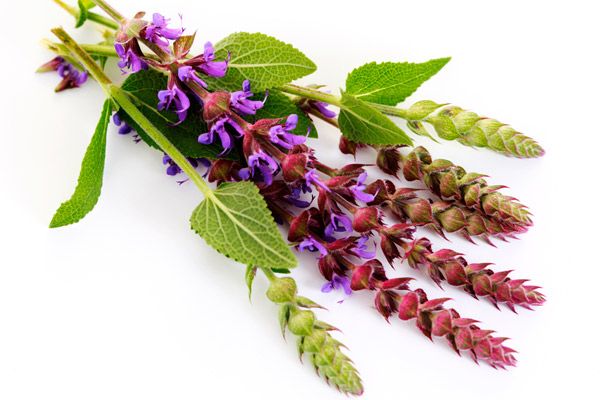
Sage leaves contain medicinal properties, they contain essential oils, highly active alkaloids, tannins, and a large amount of vitamins B and P. Thanks to these components, sage acts on the body as a disinfectant, anti-inflammatory, antispasmodic, astringent and thermoregulatory agent.
Sage during menopause has the following effects:
- regulates hormonal changes;
- reduces night sweats and hot flashes;
- relieves nervous tension, irritation, depression, mood swings;
- relieves abdominal cramps;
- has a beneficial effect on the genitourinary system;
- improves sleep;
- relieves attacks of headache and dizziness.
Traditional medicine and doctors recommend taking herbal teas, where the main component is sage, and motherwort, savory, hawthorn, lemon balm can be added to it. Such herbal teas have a good effect during menopause, and it can be noticed within a few hours after taking them.
Sage tea has proven itself well, reducing excessive sweating, improving blood circulation and increasing vascular tone. To prepare it, you need to pour 2 teaspoons of dry sage leaves with a glass of boiling water and let it brew. Tea can be taken up to 8 times a day. Sage tincture, freshly squeezed juice from the leaves and essential oil are also used.
You can learn about the benefits of sage during menopause, treatment methods and rules for taking it from your doctor, because you should not forget that sage, like any other remedy, has contraindications and can cause side effects.
Orthilia secunda during menopause
In gynecology, the orthilia secunda is often used, which has a unique healing effect on the female body during menopause. It will help not only to avoid premature aging of the body, but also to eliminate unwanted symptoms of menopause. The fact is that with the onset of menopause, the level of estrogen in the woman's body significantly decreases, and the orthilia secunda contains natural estrogens and progesterones, which:
- actively affect the formation of the endometrium (the internal mucous lining of the uterus);
- normalize hormonal balance;
- reduce premenstrual pain, which is especially important during menopause;
- restore metabolic processes;
- normalize blood circulation and the functioning of sweat glands.
During menopause, the orthilia secunda has a beneficial effect on the woman’s body and eliminates the following symptoms:
- reduces the intensity and number of hot flashes;
- reduces irritability, depression, improves the functioning of the nervous system;
- stabilizes blood pressure;
- regulates hormonal balance;
- prevents bleeding;
- reduces the occurrence of tumors, the risk of which often occurs during menopause.
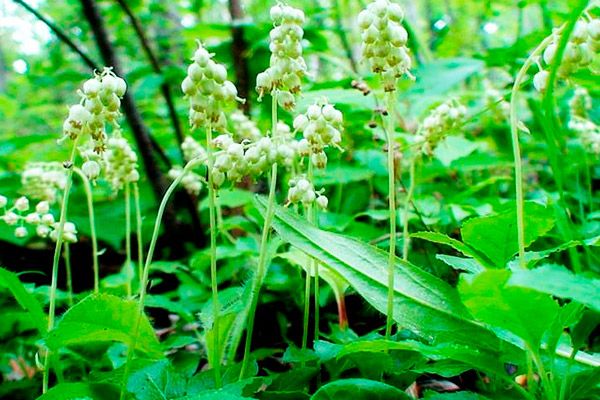
The orthilia secunda has been used during menopause for many years. The plant is toxic, so in this case it is better to take into account the recommendations of a doctor who will prescribe the correct dose and method of application, since in the pharmacy network the orthilia secunda is sold in packaging with different grinding, there is tea in bags and tincture.
Shatavari for menopause
Many women during menopause use shatavari, a plant that has a beneficial effect on the reproductive system. The literal translation of the word "shatavari" means "having a hundred husbands", the plant is truly an elixir of youth.
Eastern medicine considers shatavari a panacea for women's diseases, where it is used to treat infertility, normalize the hormonal and immune systems of the body, in case of dysfunction of the reproductive system, and also to improve sexual relationships.
The plant is considered a kind of balm for women, as it is a powerful progesterone stimulator, which prevents the development of female diseases such as fibroids, mastopathy, cervical erosion and other diseases.
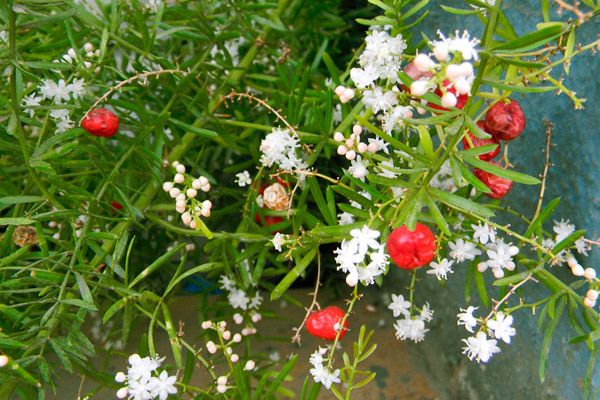
Shatavari has a high content of bioflavonoids and natural antibiotics, which helps cleanse the blood and mucous membranes of the genital tract. It also contains many analogues of female sex hormones, and many doctors prescribe it for menopause, as well as in cases of uterine removal surgery.
During menopause, when natural hormone production is sharply reduced, shatavari decoctions, tablets, capsules or powder can be prescribed. The components of this miraculous herb are included in many homeopathic preparations that contain female sex hormones, and during menopause they serve as a kind of support for women. Thus, shatavari can “prolong youth” and eliminate most of the adverse symptoms associated with menopause.
Herbs for insomnia during menopause
During menopause, women often experience sleep disturbances, and there are several reasons for this, such as:
- Hormonal imbalance, especially a decrease in female sex hormones such as estrogen and progesterone, affects the normal functioning of the nervous system;
- lack of estrogen causes increased sweating, hot flashes and increased heart rate. All of these symptoms interfere with good sleep;
- Psychological problems such as frequent depression, anxiety, and depression that occur during menopause are often the main cause of poor sleep.
Often, with insomnia during menopause, herbs can be a real salvation, because they have a calming effect on the entire body and almost never cause side effects. They can always be found in the home medicine cabinet, or, in extreme cases, can be bought at a pharmacy at any time.
During menopause, lemon balm, mint, motherwort, and chamomile are good. Thyme, rose hips, hops, and peony are also very helpful. Herbs can be used individually or in combinations, including several types at once, which can complement each other wonderfully.
Here are some examples of the most popular recipes used for sleep disorders during menopause:
- a decoction of hop cones and hawthorn in equal proportions, pour boiling water over it and let the decoction steep well. Drink the infusion in small sips before bed;
- Motherwort and valerian root, taken in equal proportions, calm the nervous system well, normalize heart rhythms and blood pressure, and valerian reduces anxiety, an unpleasant feeling of tightness in the chest, which is often observed during menopause. Take the decoction half an hour before bedtime;
- Chamomile tea is brewed in the usual way, if desired, you can add a teaspoon of honey and a little cinnamon. It will calm your nerves and help you get ready for a good night's sleep.
The composition of tea can be combined and include herbs such as:
- oregano, has an analgesic and antiseptic effect;
- valerian, has a calming effect;
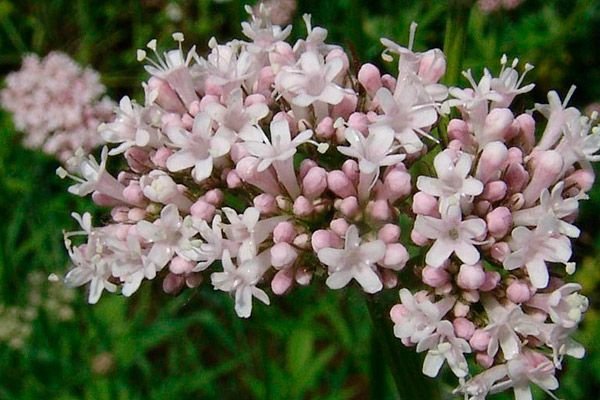
- Shepherd's purse has hemostatic and healing effects;
- motherwort, which has characteristic sedative properties;
- Hawthorn, which helps prevent heart disease.
Today, in the pharmacy chain you can buy ready-made herbal infusions and special herbal teas developed specifically for women for insomnia during menopause.
When used correctly and in all proportions, medicinal herbs and herbal infusions will help you fall asleep easily. They are not addictive and can be combined with other medications. Honey and milk can be used simultaneously with herbs, which are preferably taken before bedtime to maintain normal blood glucose levels.
The problem of insomnia should not be ignored, as proper rest is especially important for a woman during menopause. Good sleep will help the body quickly adapt to such a restructuring of the body.
Herbs that induce menstruation during menopause
The onset of menopause causes anxiety in some women, and when their menstrual cycle is disrupted, many turn to doctors for help in the hope of delaying the onset of menopause.
If the first signs appear at 48-50 years of age, without causing complications, there is no point in delaying the natural process and inducing menstruation, as this is not reasonable and can cause complications.
The situation is completely different when early menopause begins in young women who have not yet given birth. It is possible to delay its approach and restore menstruation at the initial stage with the help of medical preparations, the choice of which is currently quite large, but it is better to turn to traditional medicine and use herbs.
It should be noted that to stabilize the menstrual cycle, it is necessary to take herbs regularly, and occasional use will not give positive results. You can return the menstrual cycle with the help of the following herbs: red clover, soy, sage, linden, oregano, black cohosh and others. They contain plant hormones, can have a beneficial effect on the egg and resume the menstrual cycle.
Herbal infusions such as nettle, knotweed, yarrow, rose hips, elecampane root and pink radiola have proven themselves to be positive. You need to take 2 tablespoons of each herb and mix them, then pour boiling water over one part of the mixture and leave for about 10-12 hours, then strain. Take the infusion half a glass 3 times a day.
Traditional healers recommend taking a strong decoction of onion peel; after taking it, menstruation appears the next day.
The monastery tea, which contains oregano, sage, motherwort, rose hips, hawthorn and other herbs, has good reviews from women. It helps restore menstruation, and during menopause, relieve a woman of dizziness, hot flashes and other unpleasant symptoms.
Doctors do not recommend inducing menstruation on your own, as this can cause many unpleasant consequences, so before taking herbs it is better to consult a doctor.


 [
[